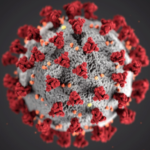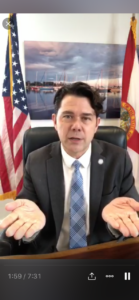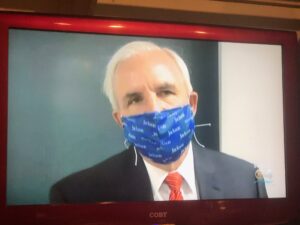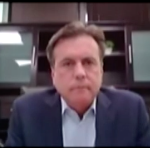Miami City Commissioners want their county counterparts on Tuesday to reconsider their paltry offering from the $474 million federal CARES cash pie they got — $30 million to be shared between all 34 municipalities in Miami-Dade — to aid in the COVID-19 crisis recovery and resuscitate the economy.
Or else they could take the county to court.
Their unanimous vote on Monday gave City Attorney Victoria Mendez the green light to sue the  county, the state or the federal government in order to get their fair share of the $474 million already awarded from the Coronavirus Aid Relief and Economic Security Act as well as future relief and stimulus packages. It comes a week after Miami-Dade Mayor Carlos Gimenez pulled a bait and switch, saying municipal mayors would have to share $30 million of the federal dollars rather than the $135 million they had originally discussed.
county, the state or the federal government in order to get their fair share of the $474 million already awarded from the Coronavirus Aid Relief and Economic Security Act as well as future relief and stimulus packages. It comes a week after Miami-Dade Mayor Carlos Gimenez pulled a bait and switch, saying municipal mayors would have to share $30 million of the federal dollars rather than the $135 million they had originally discussed.
Ladra thought it was going to be a class action lawsuit with other cities, which is something Miami Mayor Francis Suarez and other mayors said last week. And it may still be. But the city of Miami obviously wants to move forward quickly.
Read related: Miami-Dade’s Carlos Gimenez hoards COVID-19 CARES money, irks cities
“We need to have access to those funds and we don’t right now,” said Commissioner Ken Russell, who  made the motion to empower the city attorney to take legal action. “We cant wait to see what happens at the county mayoral election. We can’t wait to see what happens on the Senate approval of the further CARES package.
made the motion to empower the city attorney to take legal action. “We cant wait to see what happens at the county mayoral election. We can’t wait to see what happens on the Senate approval of the further CARES package.
“We have nearly half a million people here,” Russell said. “We have 4,ooo employees and we have been on the front line of this pandemic since it began, making sure we do what we have to do to keep our residents safe, to keep our businesses surviving and to keep our services going.”
Russell said the federal government states that smaller municipalities under 500K people are to get 45% of the funds, but that there is no mechanism or enforcement of that in the CARES Act. “There are guidelines and we believe that the county and the state is not following those.
“That is not happening. So we are left begging he county for an allocation of the money.
“For lack of guidance and leadership, municipalities across the country have been putting their own systems together, like a patchwork and we simply don’t have the resources,” Russell said in a video he posted on social media Monday afternoon. “Yet we are doing what we have to do.”
The city of Miami has spent already realized $20 million in losses, he said. That’s lost revenue, not counting the additional expenses for first responders, personal protective equipment, testing, meals,  food distribution, business loans, and rental and eviction assistance.
food distribution, business loans, and rental and eviction assistance.
“These are all things the city of Miami has been spending on, some of which can be reimbursed but much of which we do not have a safety net on,” Russell said, adding that if services are cut, 911 call takers and fire rescue personnel could lose their jobs.
“The CARES Act had sufficient money to get that rolling, but there was not sufficient guidance to make sure it rolls down to a city like ours,” he said.
“Smaller municipalities are getting the short end of the stick.”
Read related: 25 mayors slap Carlos Gimenez on solo rollback, demand more contact tracing
On Tuesday, Miami-Dade Commissioners will have an opportunity to discuss the rift and the potential legal action at yet another special virtual meeting, when they consider spending yet another $3 million from the federal funding package on assistance to displaced hotel industry.
The meeting might also give commissioners an opportunity to rethink their allocations and provide more relief for cities. After all, the three commissioners running for mayor on the ballot that will be decided in two weeks have each said they thought the cities should be more involved in decision making. There is also an item on the commission meeting agenda to make the unincorporated municipal services area the equivalent of a city for the purposes of the allocation of CARES funds. So maybe not.
Gimenez keeps saying that the money will go to the residents of the county and not to the governments.  Except that Miami-Dade is a government that will get and spend the money. He said there were not going to be any blank checks written to cities, except he wrote a blank check $20 million to the United Way, which doesn’t seem like a valid replacement.
Except that Miami-Dade is a government that will get and spend the money. He said there were not going to be any blank checks written to cities, except he wrote a blank check $20 million to the United Way, which doesn’t seem like a valid replacement.
Truth is everyone wants it for political palanca. Grimenez may just want to score points during his congressional campaign, especially since he is losing points daily on his response. City mayors and other electeds say they have their finger closer on the community’s pulse and know better what their residents need in allocations. But they may also be interested in winning favors in exchange for federal aid.
Read related: COVID-19 rollback reveals Carlos Gimenez is flying blind here
That also includes former Gimenez allies like Coral Gables Mayor Raul Valdes-Fauli, Hialeah mayor Carlos Hernandez and Doral Mayor JC Bermudez, who blasted the mayor on Miami Cuban radio last week, saying he no longer could support his congressional bid, and Miami City Commissioners Joe Carollo , who worked on the 2016 campaign doing nobody knows what for $6,000 a month, and Alex Diaz de la Portilla, who ran the 2011 campaign that created FrankenGimenez, the strong mayor, on the heels of a historic recall.
On Monday, Alex DLP made the motion to raise the amounts the city would spend on relief programs  through the end of the year from a total of $76 million to $90 million, going from $2 to $3 million in food distribution programs, from $9 to $15 million in eviction prevention, rental and mortgage assistance and from $5 to $10 million in small business aid.
through the end of the year from a total of $76 million to $90 million, going from $2 to $3 million in food distribution programs, from $9 to $15 million in eviction prevention, rental and mortgage assistance and from $5 to $10 million in small business aid.
“For the people that really need it and not some political slush funds,” Diaz de la Portilla said. “The ball is in Mayor Gimenez’s court.”
And city leaders think that may not even be enough.
Russell hinted that Grimenez, who has been battling with Suarez since before the pandemic began, might have personal grudge reasons for the bait and switch pulled on Miami.
“These sort of allocations should not be tied up in any sort of personal politics.”

